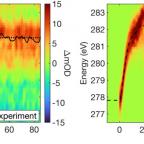Q-Chem Webinar 68: Orbital optimized density functional theory for core-level excited states and applications to molecular symmetry breaking
May 11th, 2023
Q-Chem is excited to announce the Besley Award Webinar (Webinar 68), to be presented on May 25 by Diptarka Hait!

Electronic excited states with singly occupied inner shells are challenging to model with traditional linear response methods like time dependent density functional theory (TDDFT), due to lack of core-hole relaxation. State specific orbital optimization (OO) ameliorates this issue, but OO-DFT has been historically challenging on account of difficulties in converging to the desired excited state solution.
In the first part of the talk, we will present the methodological advances towards effective modeling of excited states with OO-DFT. We will focus on the square gradient minimization (SGM) method for cheap and reliable excited state orbital optimization, and techniques for recoupling spin contaminated Slater determinants to attain spin-pure results. We will then highlight the utility of OO-DFT in accurately modeling core-level spectra, especially with the SCAN functional.
In the second part, we will highlight how OO-DFT is leveraged to study transient X-ray absorption spectroscopy, in collaboration with experimentalists. We examine the Jahn-Teller distortion of the methane cation, which is found to occur in ~10 fs from both experiment and OO-DFT. Theory further reveals that the X-ray signal dynamics result from the scissoring motion about the smallest bond angle of the cation, which controls the extent to which the singly occupied level is bonding or nonbonding. We also utilize OO-DFT to study the symmetry breaking and bond dissociation dynamics in the carbon tetrachloride cation by using information from both the C 1s and Cl 2p levels. These demonstrate the ability of OO-DFT calculations to validate and interpret cutting edge transient X-ray absorption experiments.
Diptarka Hait received his S.B. degree from MIT in 2016, and his PhD from UC Berkeley in 2022 (advised by Prof. Martin Head-Gordon). He is currently a Stanford Science Fellow hosted by Prof. Todd Martinez, and is investigating computational photocatalysis.